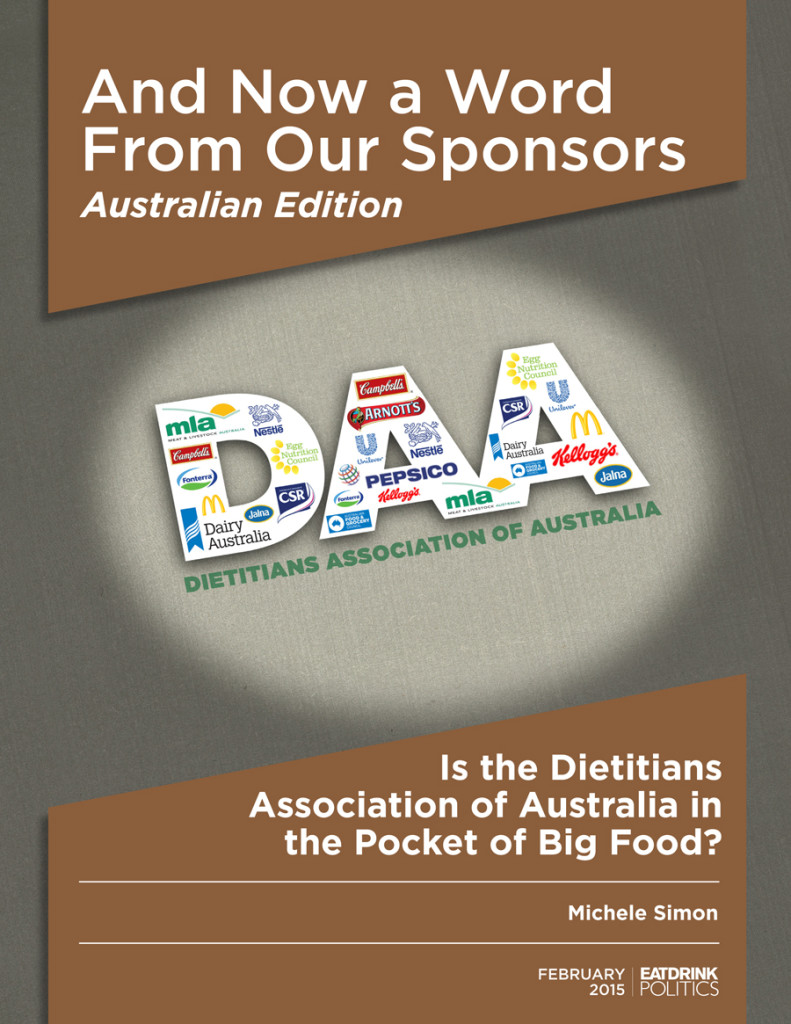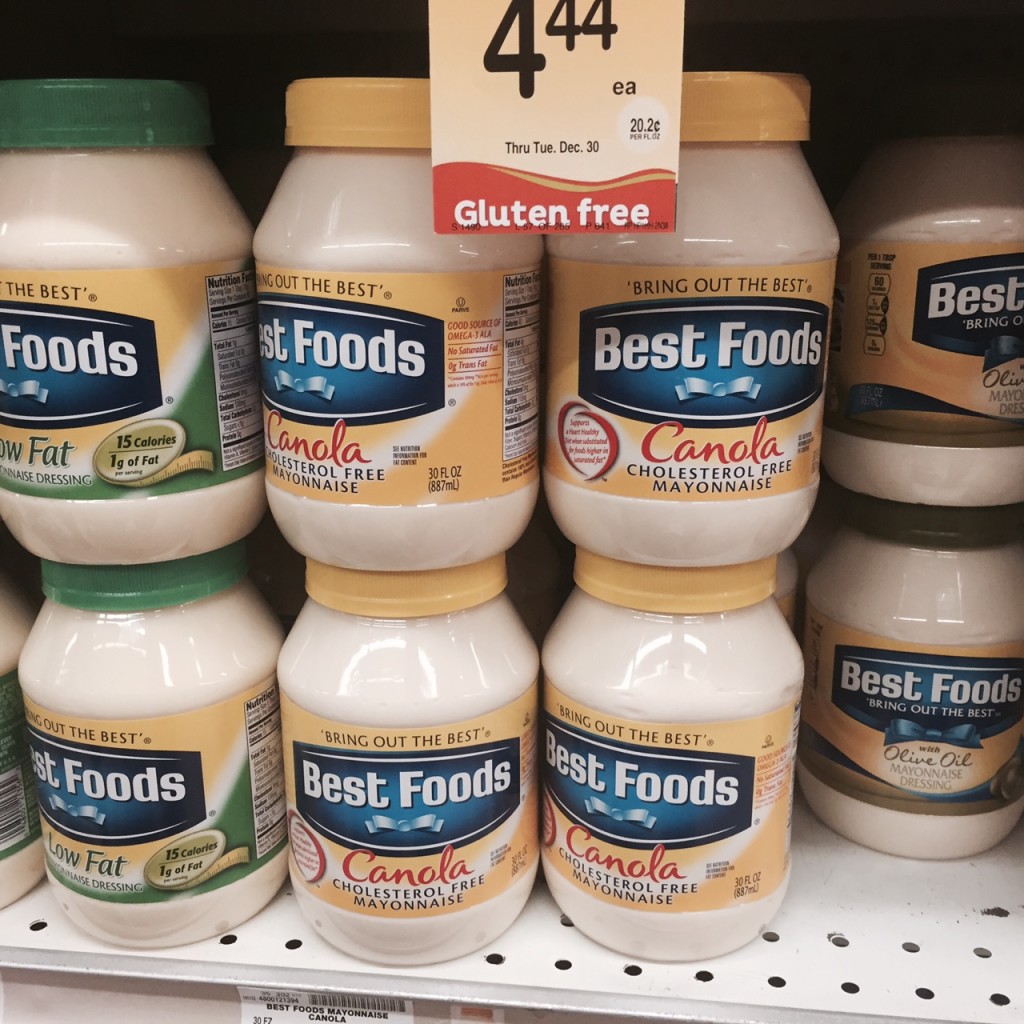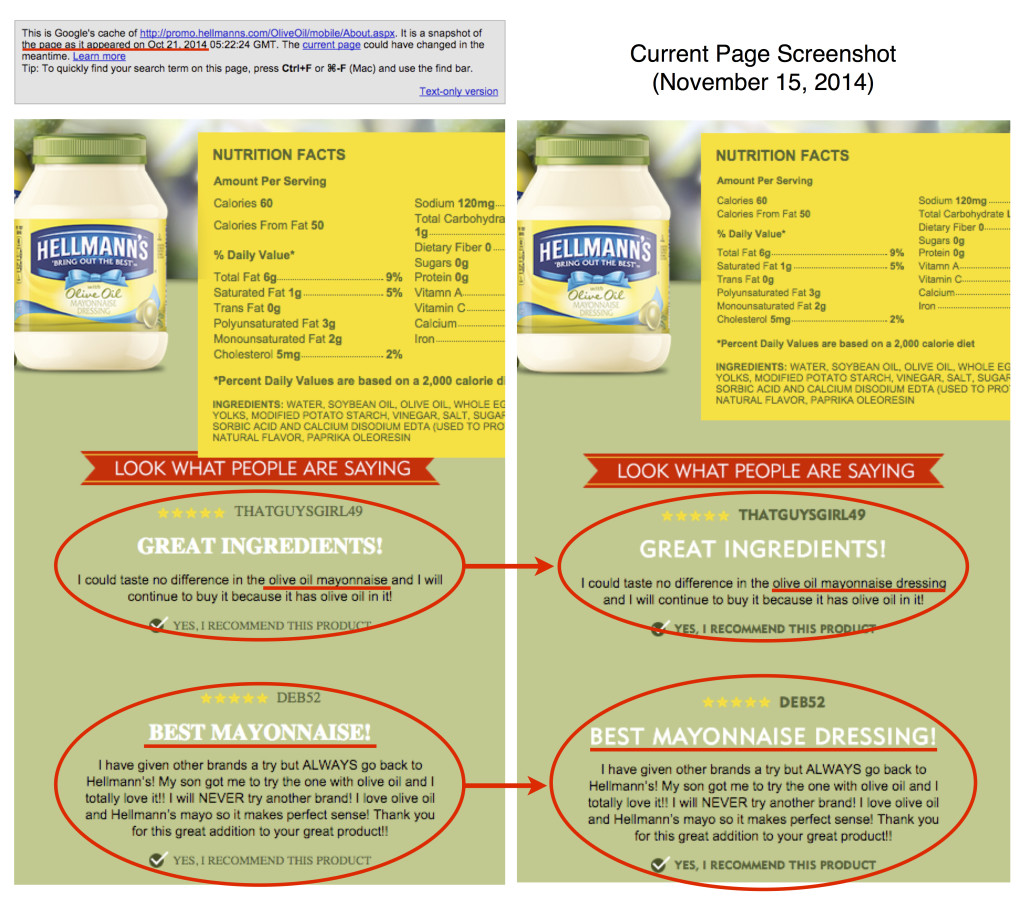Earlier this month, the nation’s largest health charity, the Robert Wood Johnson Foundation, announced a $500 million commitment over the next decade to curb childhood obesity, adding to its previous spending of the same amount since 2007. A billion dollars over 18 years is a lot of money. But let’s place it in context: The soda lobby spent at least $100 million in five years on public relations alone, for advertising campaigns that thwart many of the policies the foundation supports. While we know that industry vastly outspends nonprofit advocacy groups on lobbying, new data reveals that spending on public relations may be even more important. Read rest at Al Jazeera America …

BLOG
Is the Dietitians Association of Australia in the Pocket of Big Food?
New Report from Eat Drink Politics Exposes Conflicts of Interest in Australian Dietitians Group
 Just as most western nations do, Australia suffers significantly from diet-related chronic diseases. Heart disease is the leading cause of death, killing one Australian every 12 minutes. Diabetes is also a serious health concern, with rising rates in recent years, according to the government.
Just as most western nations do, Australia suffers significantly from diet-related chronic diseases. Heart disease is the leading cause of death, killing one Australian every 12 minutes. Diabetes is also a serious health concern, with rising rates in recent years, according to the government.
The 2013 report, “And Now a Word from Our Sponsors,” also from Eat Drink Politics, found that the Academy of Nutrition and Dietetics in the United States has a serious credibility problem due to its myriad conflicts with the junk food industry. Sadly, a very similar situation exists within Australia’s dietetic profession, led by the Dietitians Association of Australia. Among the most troubling findings of the new report from Eat Drink Politics:
Event – February 24 – Women in Leadership: Dynamic Career Paths in the Food Movement
 Join four women warriors who have fought Big Food with policy initiatives, defying gender and racial stereotypes in both the public and private sectors. Their work has strengthened the good food movement, and all have established successful careers despite the odds stacked against them. This interactive panel will share experiences and encourage food movement job seekers to tackle the challenges of pushing for a more progressive food systems agenda.
Join four women warriors who have fought Big Food with policy initiatives, defying gender and racial stereotypes in both the public and private sectors. Their work has strengthened the good food movement, and all have established successful careers despite the odds stacked against them. This interactive panel will share experiences and encourage food movement job seekers to tackle the challenges of pushing for a more progressive food systems agenda.
Panelists
Marion Nestle is Paulette Goddard Professor of Nutrition, Food Studies, and Public Health at New York University. A pioneer in food politics and the author of numerous books, she will discuss her experience and knowledge in the academic and government sectors, the vast changes she has witnessed over the years, and share advice for students about opportunities in the food movement.
Michele Simon is a public health lawyer and president of Eat Drink Politics, a corporate watchdog consulting firm. She has been writing about the politics of food since 1996 and her book, Appetite for Profit, was published in 2006. She also offers legal guidance to small food companies with Foscolo and Handel, the Food Law Firm. She will discuss the role of lawyers and policy experts in the food movement and the need for advocates to get more political.
Nina F. Ichikawa is a writer, social justice advocate, and food policy expert who will discuss the “whitewashed history” of the food movement, her policy work with the USDA, and her vision for the Berkeley Food Institute where she has just been appointed policy director. Her writings on food policy and Asian American food, farmers, and retailers have been published in Amerasia Journal, Civil Eats, Al-Jazeera America and NBC News, as well as in “Eating Asian America”.
Moderator: Haven Bourque founded HavenBMedia to bring communications expertise to food system change. Her group develops communications strategies, trains spokespersons, and teaches social media skills for diverse organizations ranging from prestigious non-profits to small businesses, national corporations and community activists working to reform food systems around health and wellness, social justice and environmental conservation.
When: Tuesday February 24, 6:30-8:30pm
Where: Impact Hub Oakland (Omi Gallery) 2323 Broadway, Oakland (donations at door welcome)
RSVPs: 2/19 update: sorry but this event is over capacity!
Top 10 Legal Victories for the Food Movement in 2014
In my ongoing attempt to shine a light on the critical role that lawyers play in the food movement, here are just a few examples of legal victories this past year. As this list demonstrates, we need lawyers to both proactively change the law, and to defend against legal challenges. This was an especially good year for legal victories. So thank a lawyer! Continue reading →
Unilever Drops Mayo Lawsuit Giving Hampton Creek Another PR Boost
You almost have to feel sorry for Big Mayo. After getting slammed with negative press last month for its ill-conceived lawsuit against Hampton Creek, Unilever raised the white flag by dropping the case. But instead of burying the news late on a Friday, the company put out its release at 6pm on Thursday, at the end of what was a huge news day for Hampton Creek. The San Francisco start-up announced an additional $90 million in investment capital, a strong indicator that the lawsuit actually attracted more investors instead of scaring them off.
A Google news search this morning for Hampton Creek reveals about 200 news stories, a mix of coverage for its fundraising success and the lawsuit being dropped. In other words, Unilever gave reporters an additional angle to shine a positive light on Hampton Creek and keep the media coverage going from yesterday into today. (My favorite headline is from CNN Money: “Unilever lays an egg: Drops Just Mayo lawsuit”.)
But what most media outlets ignored was how unprecedented it is for the party filing a lawsuit like this to simply drop it, without getting anything in return, and before any court hearings. It’s clear that Unilever realized its mistake and just wanted the whole thing to go away, and just in time for the holidays. It’s a fitting end to a colossal PR blunder. As the Los Angeles Times put it: “The mayo war was over before it even began.”
Hampton Creek raises $90 million as investors bank on a plant-based future

Update at 3:30 pm PT: Unilever just announced it’s dropping the lawsuit. Great idea.
Here’s a winning formula any start-up would want to emulate: Step 1) Engineer a high-quality, more sustainable product to compete in a multi-billion dollar category such as mayonnaise; Step 2) When your competition gets mad enough to file a lawsuit against you, use it your advantage in the media; Step 3) Raise $90 million from investors.
That’s pretty much how Hampton Creek has played it. As I wrote about last month, Unilever sued Hampton Creek over the San Francisco start-up’s Just Mayo product for not containing eggs, which is the entire point of the product. Unilever (maker of Hellmann’s) was upset because Just Mayo was “stealing market share”. But the lawsuit backfired when the multinational giant was excoriated in the media for bullying the little guy. Meanwhile, Hampton Creek received heaps of positive press and increased sales. According to one estimate, just a week of media attention generated about $21 million of free advertising for Hampton Creek.
All that certainly didn’t hurt the company’s efforts to attract additional capital investments, as Hampton Creek has just raised an additional $90 million, bringing the total to $120 million. According to the San Francisco Business Times, the lawsuit “may have helped solidify the company in the eyes of investors”.
The vote of confidence, particularly from high-tech investors, signals a bright future for innovative companies willing to challenge the status quo. New mission-driven companies like Hampton Creek offer a beacon of light to investors seeking an opportunity to put their money toward positive solutions such as creating delicious replacements for unsustainable animal foods. And if they ruffle some feathers of Big Food along the way, that’s a good sign.
Hampton Creek CEO Josh Tetrick (pictured above) told the San Francisco Business Times:
I think what [the lawsuit] did is that it showed all of these people, and our funders, that we’re really not [messing] around. When we say we have a point of view about being mainstream and making healthier food more affordable — even when one of the biggest players in the world comes down on us in a lawsuit — we hold our ground.
Keep holding that ground, it’s working wonders, while making Unilever look even worse.
Big Food Confronts High-Tech Challengers
Innovative food startups trying to curb soaring meat production can expect legal and political obstacles
Growing more and more animals for food is unsustainable. The World Health Organization predicts that global annual meat production will increase from 218 million tons in 1998 to 376 million tons by 2030. That uptick will bring with it numerous negative consequences, including deforestation, animal manure contamination of air and water and excessive use of water supplies and harmful energy sources, not to mention contributions to climate change.
Recognizing this problem, food startups backed by significant venture capital are hoping to create food products without using animals. The goal: provide a viable alternative to the existing animal foods production model that is wreaking havoc on the environment, public health and animal welfare. As a new wave of products aiming to mimic meat, eggs and dairy comes to mainstream supermarkets, Big Food’s pushback will only mount — and what started in the lab will soon make its way to the political arena. Read rest at Al Jazeera America …
Walmart’s Hunger Games
New report from Eat Drink Politics shows how the nation’s largest retailer is a poverty incubator, contributing to the hunger crisis in America while Walmart and the Walton family get richer
La’Randa Jackson, shown here, supports her mother and her younger brothers by working at the Walmart store in Cincinnati, Ohio. “I skip a lot of meals,” she says. “The most important thing is food for the babies, then my younger brothers. Then, if there’s enough, my mom and I eat.”
La’Randa works for the nation’s largest private employer, and she is not alone in her struggle to afford enough food.
On $10.10 an hour and an unpredictable part-time schedule, Cantare Davunt – a Walmart customer service manager from Apple Valley, Minnesota – winds up digging into her cabinets for older, non-perishable foods like Ramen so she can have a hot meal. Diana Tigon, a cashier at the Walmart store in Arlington, Texas, often finds she is strapped for cash and during rough weeks goes full days without eating meals.
Hey Unilever, is it mayonnaise or mayonnaise dressing?

The image on the left is a picture taken by Josh Tetrick, CEO of Hampton Creek, at a Safeway in San Francisco on Sunday, November 16. It shows the Best Foods Canola Cholesterol Free variety labeled “mayonnaise.” However on the Best Foods website is the image on the right, which has the same product labeled “mayonnaise dressing”. According to federal law, to be called “mayonnaise” the product must contain at least 65 percent oil by weight, which this product does not. For more details on mayogate see my post from yesterday.
Mayogate: Unilever Doctoring Customer Reviews
Big Mayo scrubbing Hellmann’s website to cover up deception after filing lawsuit against Hampton Creek
Screen shots of Hellmann’s promotion showing altered customer reviews. (Click for larger resolution.)
Last week I wrote about the negative PR backlash against global giant Unilever for its desperate lawsuit against Hampton Creek over Just Mayo, a new product made without eggs that is quickly stealing market share from twin brands Hellmann’s and Best Foods, the market leaders. Most corporations shy away from filing these sorts of competitor lawsuits and Unilever is about to find out why.















